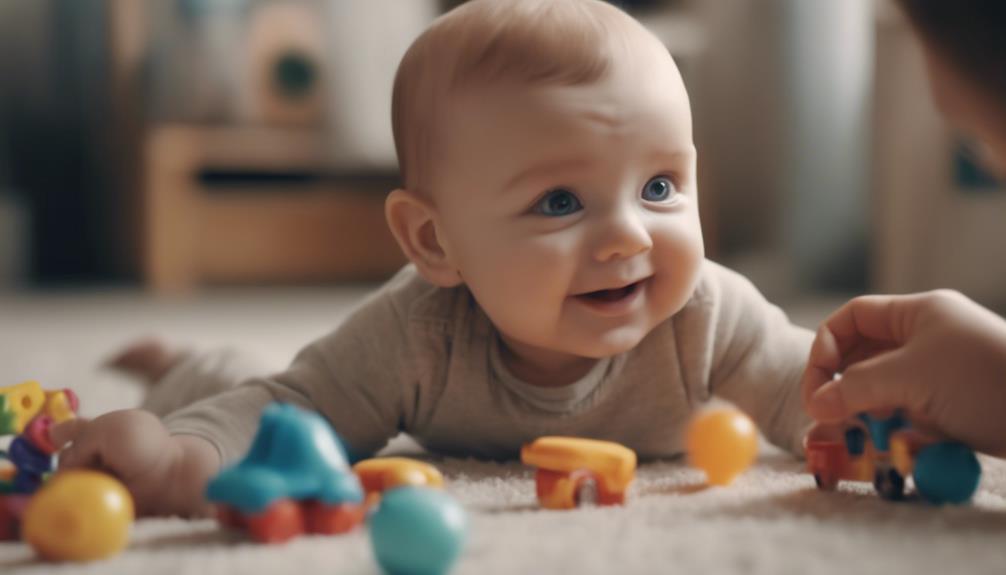If your toddler isn’t speaking their first words by 12 months or isn’t combining words by age 2, it may be a sign to seek help. Watch for limited gestures, difficulty understanding instructions, or if they’re very quiet compared to peers. While some children are late talkers and catch up on their own, ongoing delays or concerning behaviors warrant evaluation. Keep exploring to understand more about when early support can make a difference.
Key Takeaways
- Most toddlers say their first words by 12 months and have around 50 words by 18 months; significant delays may need attention.
- Watch for lack of gestures, not responding to names, or minimal communication by 18 months.
- Not combining words into phrases by age 2 could indicate a speech delay worth evaluating.
- Variability exists; some children are late talkers but catch up without intervention.
- Early screening and intervention can improve communication skills and address underlying issues promptly.

Determining whether your child’s speech development is a delay or simply a late bloomer can be challenging, especially when you’re enthusiastic to understand what’s normal. Every child develops at their own pace, but knowing the typical language milestones can help you gauge whether your toddler is on track. By around 12 months, most children say their first words, like “mama” or “dada,” and by 18 months, they usually have a vocabulary of about 50 words. By age two, they often begin combining words into simple phrases, such as “want cookie” or “go park.” If your child isn’t meeting these milestones, it might raise concerns, but it’s important to remember that some kids develop speech skills more slowly without any underlying issues.
To better understand where your child stands, consider scheduling a developmental screening. A developmental screening is a quick assessment performed by a professional, often during well-child visits, designed to identify potential delays early on. This isn’t a diagnostic test but rather a way to flag if further evaluation is needed. If the screening indicates your child isn’t reaching expected language milestones, it can be a sign to seek more thorough evaluations from specialists, like speech-language pathologists. Early identification can make a big difference in providing support and intervention, which can help your child develop communication skills more effectively.
If your child’s speech isn’t progressing by the expected age or if they aren’t using words to communicate by 18 months, you should monitor their progress closely. Some children are late talkers but catch up later without intervention, yet others might have underlying issues such as hearing problems or developmental disorders that need addressing. Signs that warrant prompt professional evaluation include limited gestures like pointing or waving, lack of response to name, difficulty understanding simple instructions, or if your child seems to be very quiet compared to peers. Additionally, understanding the role of early intervention can be crucial in supporting children with speech delays.
Frequently Asked Questions
Can Speech Delay Resolve on Its Own Without Intervention?
You might wonder if speech delay resolves on its own. While some children catch up naturally, early intervention with speech therapy is essential for others. If you notice your toddler isn’t forming words or understanding speech by age two, seeking professional help can make a big difference. Early intervention often leads to better outcomes, so don’t hesitate to consult a specialist if you’re concerned about your child’s speech development.
Are Boys More Prone to Speech Delays Than Girls?
Back in the day, folks thought boys and girls were wired differently, and that’s still partly true. Gender differences can influence developmental milestones, including speech. Studies show boys are more prone to speech delays, but it’s not a certainty. Every child develops at their own pace. If you’re concerned about your toddler’s speech, it’s best to consult a professional, regardless of their gender, to guarantee healthy development.
How Can I Encourage My Child’s Language Development at Home?
You can encourage your child‘s language development at home by engaging in interactive reading sessions, where you ask questions and discuss stories together. Sing along activities also boost vocabulary and pronunciation, making learning fun. Speak clearly and often, narrate daily routines, and encourage your child to express themselves. These activities help build their confidence and foster language skills naturally, creating a supportive environment for early communication growth.
What Are the Signs That Indicate a Serious Speech Problem?
You should watch for signs like your child struggling to be understood, not using words by age two, or having difficulty imitating sounds. If these issues persist, early intervention can make a big difference. Seeking speech therapy promptly helps address serious speech problems and supports your child’s communication skills. Trust your instincts and consult a professional if your concerns continue, ensuring your child gets the help they need.
Is There a Genetic Component to Speech Delays?
When it comes to speech delays, you might wonder if genetics play a role. The answer is yes; genetic factors and a familial history of speech or language issues can influence your toddler’s development. Think of it as passing down a family recipe—sometimes, traits are inherited. If you notice concerns and there’s a family history, it’s wise to consult a professional early. Being proactive helps set your child up for success.
Conclusion
If you think your toddler’s speech is taking forever to explode, don’t wait for it to turn into a full-blown problem. Early help isn’t just a small boost—it can be the difference between your child chatting away like a chatterbox or missing out on a lifetime of words. Trust your instincts, act quickly, and remember: every day you wait could be like missing the chance to open a world of endless conversations and endless possibilities.









